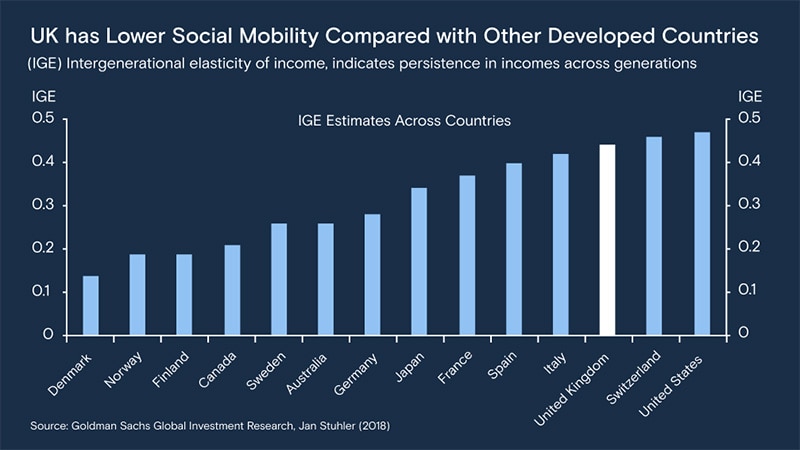In a world awash in increasing quantities of data, it is vital to identify the right indicators that can drive progress. Data provides critical information to identify areas in need of further investment and can reveal how capital can be most efficiently deployed to drive solutions.
Driving a New Climate
Data breaks down biases, helps benchmark change, closes knowledge gaps, and holds organizations accountable to their commitments. We’ve leveraged data in a number of crucial ways to drive more sustainable outcomes.
- The GS SUSTAIN team helps identify environmental, social, and governance exposures for a company’s sector. By analyzing data from ESG data providers and GIR equity analysts, the GS SUSTAIN team has identified the most relevant metrics to evaluate ESG engagement for more than 7,000 companies. Many of these metrics are accessible through an API, so clients can now analyze their portfolios through GS SUSTAIN’s ESG lenses.
- Our new Carbon Portfolio Analytics tool offered through Marquee helps clients measure and manage the carbon footprint of their portfolios. Beyond providing carbon data, this new offering provides tools and analytics so clients can inform their investment decision-making with a better understanding of their portfolio risks and opportunities from a carbon perspective.
- We believe companies that effectively attract, deploy, and retain high-quality employees are better positioned for long-term growth. Our Quantitative Equity business deploys natural language processing (NLP) techniques to extract insights from the written portions of employee reviews on Glassdoor. Our NLP algorithms treat each word, or set of words, in a review as a unique variable and then seek to identify which variables are best distinguished between positive and negative reviews. This approach lets us to use employee satisfaction data to determine the long-term growth potential of a business.
Measuring Social Mobility
Compared with other countries, the most disadvantaged in the U.K. are less likely to climb the income ladder and the economically advantaged tend to stay at the top. In our 2022 research report The Bigger Picture: UK Social Mobility – A Tough Climb, we investigated what needs to be done to improve mobility and opportunity for people in the U.K. The following is excerpted from a Q&A with the report’s authors, European Strategist Sharon Bell and Chief U.K. Economist Steffan Ball.

Could you start by defining what social mobility is?
Steffan Ball: Put simply, it means doing better or worse in terms of lifetime outcomes than your parents. If you look at the U.K. and compare it with other developed countries, it stands near the bottom of the international league table for both social mobility and inequality... On social mobility, political debate is often focused on who climbs up the social ladder and that is critical. But it should also consider whether better off families retain their social and economic position. And on this metric too, the poorest and the richest in the U.K. are the most socially immobile. So this exacerbates social inequalities.
What are the key takeaways from your recent report on social mobility in the UK?
Sharon Bell: The key takeaway from our report is that there are things governments, policymakers and corporations can do to help address the problem. I feel that social mobility, as a particular diversity target and interest, is something that is more nascent than other areas (such as gender for example) and something which is also incredibly important given that it’s already a wide gap and gotten worse.
How can social mobility be improved in the UK?
Steffan Ball: In the report we highlighted four main policy areas for improvement. The first one is improving geographical inequality by increasing public investment in less well-off regions of the UK. The second is education and in particular focusing education on equalizing opportunities and improved access for children from lower income households. The third policy area is apprenticeships and retraining programs that are retargeted toward people from disadvantaged backgrounds. And finally, high quality digital access for less wealthy households, in particular those living in more remote locations.
To what extent can the corporate world play a positive part in improving social mobility and inequality in the country?
Sharon Bell: The corporate sector can have quite a huge influence in the UK. Who businesses choose to hire, who they decide to train, what safety nets they give people in terms of pay, healthcare, pensions, other benefits—all of those things are incredibly important. Also, how businesses invest and where they invest is so crucial. Are they investing offshore or are they investing onshore? Are they investing in a UK workforce or not? Are they just concentrated in one location, like London, or are they looking outside that?








